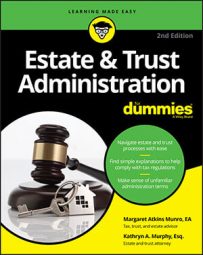Do all you can to file your 706 by the due date (as extended) and pay the estate tax on time, because you incur penalties for late filing and late payment unless you can show reasonable cause for the delay.
If you’re filing the 706 after the due date and any extensions, be sure to attach an explanation to the return to try to show reasonable cause. In addition, you pay interest on the amount of tax due from the due date for filing until the tax is paid, unless you’ve applied for and received an extension of time to pay the tax.
Absolutely nothing is worse than getting slammed with penalties because the IRS catches you undervaluing assets. Not only do you have to pay the additional tax, but valuation understatements that result in tax increases of more than $5,000 also cost you a whopping 20 percent penalty. The IRS defines a valuation understatement as reporting the property’s value as 65 percent or less of its actual value on the Form 706.
The penalty jumps to 40 percent for property valued at 40 percent or less of actual market value. And if you think you like your chances of avoiding an audit, think again. In 2006, although audit rates on individual income tax returns hovered around 1 percent, the IRS examined almost 10 percent of all Forms 706.
For estates reporting values of 5 million dollars or more, that rate rose to more than 23 percent, and as the exemption from estate tax increases and the number of estate tax returns required to be filed dwindles, the number of returns audited is expected to increase. Valuations aren’t places to cut corners, although you certainly want to use the lowest valuation supportable, in most cases.
When might a higher valuation be beneficial to the estate? When the estate doesn’t owe any estate tax anyway, the value at which the property is included on the 706 is its new “stepped-up” cost basis for income tax purposes.
Sometimes you may need a few extra months to get everything squared away with the estate before you can file the 706. If you need an extension, send your extension request to the Department of the Treasury, Internal Revenue Service Center, Cincinnati, OH 45999, no later than the original due date for the return (nine months after the decedent’s date of death).
File Form 4768, Extension of Time to File a Return and/or Pay U. S. Estate (and Generation-Skipping Transfer) Taxes to apply for extensions of both time to file and time to pay.
Extension of time to file
You receive a six-month automatic extension of time to file with regard to Forms 706, 706-A, 706-D, 706-NA, and 706-QDT, as long as you file the extension request by the due date and include payment of the estimated amount of the estate tax (or generation-skipping transfer tax). Just check the applicable box in Part II of the form.
If you have multiple executors or administrators, only one of you needs to file. Or you can have your authorized attorney, certified public accountant, Enrolled Agent, or agent holding power of attorney file for you.
You may apply for a discretionary additional extension of time to file the 706 only if you are an executor and are out of the country. Attach a statement explaining why it’s impossible or impractical to file the 706 by the due date.
If you don’t file for an automatic extension of time to file by the due date of the return, all is not lost. You can still file for an extension of time to file if you can show good and sufficient cause.
Although there’s no definition given for this phrase in the 706 instructions, be sure to attach a statement explaining why you weren’t able to apply for an automatic extension, why it was impossible or impractical to file by the due date, and why the extension should be granted. Note, however, that the extension, if granted, is for no more than six months after the due date of the return.
Extension of time to pay
You may also use the Form 4768 to apply for an extension of time to pay the estate tax under IRC Section 6161 (a discretionary extension of time to pay for reasonable cause), for an IRC Section 6163 election (reversionary or remainder interest), or for an IRC Section 6166 election (closely held business).

